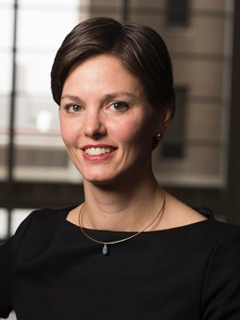HOW CAN WE HELP YOU? Call 1-800-TRY-CHOP
In This Section
Supporting Researchers With Caregiving Responsibilities

Through the COVID-19 Fund to Retain Clinical Scientists, CHOP is driving workforce equity by supporting researchers with caregiving responsibilities.
mccannn [at] chop.edu (By Nancy McCann)
The COVID-19 pandemic has exasperated and amplified caregivers' demands and responsibilities that disproportionately affect women and people of color. Especially affected are women in STEMM (Science, Technology, Engineering, Math, and Medicine) fields, such as early career physician-scientists. From delayed experiments and lost productivity in individual laboratories to the decline of networking and community building due to converted or canceled global scientific conferences, the risks are many — including the decline in representation of women in the early ranks of these fields.
Addressing this critical issue is the Doris Duke Charitable Foundation and its partners. In an effort to advance equity in the life sciences, this funding collaborative is supporting caregivers in biomedicine through the COVID-19 Fund to Retain Clinical Scientists (FRCS). Building on the promising outcomes of the original Fund to Retain Clinical Scientists Program, COVID-19 FRCS is designed to help maintain research productivity and retain early career physician-scientists faced with pandemic-related family caregiving responsibilities.

Audrey Odom John, MD, PhD
The Perelman School of Medicine at the University of Pennsylvania, together with Children's Hospital of Philadelphia, is one of 22 medical schools from across 17 states to receive a COVID19 FRCS grant. The Penn/CHOP CAregiver REtention Support (Penn/CHOP CARES) program will supplement current institutional efforts to address this serious situation and will be led by Audrey Odom John, MD, PhD, chief of CHOP's Division of Infectious Diseases, and Hillary Bogner MD, MSCE, of the Perelman School of Medicine.
"Our goal is to prioritize support for early career physician-scientists who identify as women, Black, African American, Hispanic or Latino, Native peoples, people with disabilities, or who are at economic disadvantage and have been hardest hit by the pandemic," Dr. John said. "Our program addresses a critical unmet need."
Penn/CHOP CAregiver REtention Support Program
Junior faculty from the tenure and clinician-educator tracts are eligible to apply to the program through December 13. The selection committee, which is made up of key stakeholders from within CHOP and the Perelman School of Medicine, including the CHOP Research Institute's CSO Susan Furth, MD, PhD, will announce the 10 awardees early next year. Each recipient will receive $50,000 for one year of funding, "to boost them up," Dr. John said.
In addition to the financial support to hire administrative personnel, statisticians and/or technicians, the Penn/CHOP CARES program will offer complementary activities to facilitate cohort-building, camaraderie, and career success for these faculty facing similar challenges. The awardees may choose from executive coaching, research administrative support, a writing group workshop for producing peer reviewed publications, networking brown bag lunches, one-on-one mentoring, and an end-of-year symposium highlighting the faculty research successes.
"The future of our academic health centers depends to a substantial extent on the degree to which we can effectively support all faculty," Dr. John said. "We should not accept a higher attrition and leadership gap for faculty with family caregiving responsibilities."